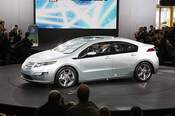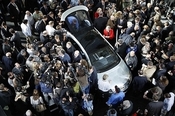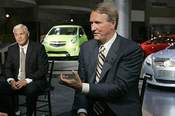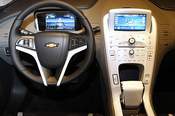Today's Detroit News newspaper reports that, because big investment banks such as Goldman Sachs and JPMorgan Chase own huge amounts of GM and Ford corporate debt, "Some of the most powerful banks on Wall Street are quietly lobbying key politicians to support a proposed $25 billion federal loan program for Detroit's struggling automakers."
(A so-called production version of the Chevrolet Volt was introduced in Detroit today to mark GM's 100th anniversary; Volt is not planned to see showrooms until late 2010 at the earliest)
It looks like the Detroit Three might get direct loans or loan guarantees totaling $25 billion, but not the $50 billion they've been requesting from Washington. An energy law enacted in December, 2007, created the low-interest loan program for Detroit but did not fund it, and some of the conditions on the money, not given much thought at the time, have risen to the fore as potential deal-breakers.
According to industry journal Automotive News, the main condition requires that the funding go to projects that help create vehicles with 25 percent higher fuel economy than comparable vehicles -- a very high bar which the Detroit Three apparently felt would never seriously be demanded of them.
Detroit car-makers are also spending huge amounts to convert truck factories into car-making plants, but these cars won't have anywhere near the 25% mpg improvement the conditions demand. In that case, these plant conversions won't qualify for the loan.
GM's Chevrolet and Saturn divisions have gas/electric hybrids in their showrooms, and more are planned-for across all their divisions. GM's crossover Equinox hydrogen-fueled fuel cell electric vehicle is already being tested across the country (as is Honda's similarly-powered FCX Clarity sedan).
(Media crowds around the Volt, GM's first plug-in hybrid)
If GM can bring their plug-in hybrid Volt concept car to market by late 2010, as they've been advertising, that could draw many import-only buyers back to The General. A so-called production-version of the Volt was debuted yesterday, to coincide with GM's 100th anniversary. It has a small on-board gasoline engine (which GM craftily calls a "generator") charging Volt's batteries so its wheels, turned by electric motors, stay turning. GM says Volt's batteries can be recharged overnight via any standard 110-volt outlet, and the first 40 miles after a full charge will be via electric-only.
But GM is also backing-away from some of their earlier claims about Volt's abilities. Saying that the gas tank on the concept car was "too big," a smaller one might help the car look better, but might also mean Volt could not achieve the 640 miles per 12 gallons of gasoline the company had been touting. And GM executive Bob Lutz has already been publicly defending the Volt's looks.
Reports also say that GM's division in Europe, Opel, will get their own unique-looking version of Volt several months before European Chevrolet dealers start selling a Volt which will closely-resemble the one sold in the US. Also, it's reported Opel's Volt will have a larger and turbocharged gasoline "generator," which might make for better mileage.
(GM CEO Rick Wagoner, right, and the corporation's North American product czar, Bob Lutz, at Volt's official coming-out party in Detroit)
Compared to Ford and Chrysler, though, GM might as well be "Buck Rogers in the 25th Century."
In the 2008 Ford line-up, there is one gas/electric hybrid, found in their old and truck-derived Escape SUV (two if you count its upscale twin, the Mercury Mariner; Bill and and Hillary Rodham-Clinton bought a hybrid Mariner after conferring with the Secret Service who assured them the vehicle could be "outfitted" with whatever gadgets necessary for their safety and protection; John McCain bought a Toyota Prius hybrid for his daughter - Or she bought it, because McCain, when asked, couldn't remember who bought it - And its purchase has riled UAW members across the country). Their all-new Flex crossover is a wonderful styling exercise, but stuck with a big V6 engine, it's no mileage champ. Ford says they'll bring the Euro version of their Focus to the US, which could attract younger buyers with its 225-horsepower Volvo engine and six-speed double-clutch transmission, which can improve mileage and performance.
Robert Nardelli, fired by his own board of directors at Home Depot this past January, now runs
privately-owned Chrysler. Guesting on Charlie Rose last week, he worried and discouraged me. After Nardelli promoted Chrysler's oxymoronic "Hemi Hybrids," Rose asked if Chrysler will have anything like the Chevrolet Volt. Nardelli smiled knowingly and said, to paraphrase, "Oh, yeah, just wait'll next year!"
That's exactly what we've heard from Detroit executives for over 30 years, since the first oil embargos and gasoline shortages in the early 1970s. Detroit should have started planning for now ... then. Other car companies sure did.
(First look at the interior of Chevrolet's Volt; GM's European division, Opel, will sell their own version of Volt, with a different body style)
Ford and GM have profitable operations overseas, but Chrysler, with few sales internationally, is most vulnerable to failure. Selling their Jeep division might be one strategy to stay alive in the US.
Some have suggested that, as a condition of these loans, the top management of all three firms must be replaced, and with no "golden parachutes."
GM, Ford and Chrysler are run by three men with little or no experience in developing, styling, engineering, building or marketing cars and trucks. GM's Rick Wagoner has been a "bean-counter" there for decades; Ford's Alan Mulally most-recently headed Boeing, and Chrysler's Nardelli was an executive at General Electric and Home Depot.
These guys wouldn't know a good car if they got run over by one.
Will this money save the Detroit Three from self-imposed implosion? "Who knows?" is the only honest answer. What I do know is that the millions of American men and women who would join the ranks of the unemployed if any of the Detroit Three utterly fail should never be punished for the arrogance, shortsightedness and, arguably, the sheer stupidity of the few people who have run these companies into the ground.